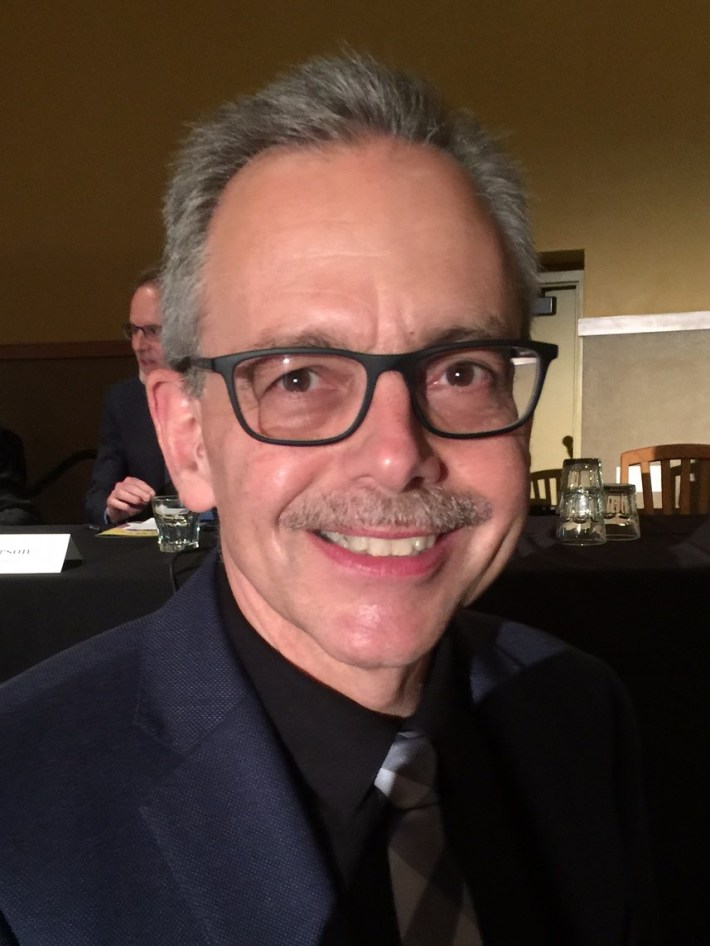
At Move L.A.'s Transportation Conversation 8 yesterday, USC professor Manuel Pastor had a list of recommendations for Metro as the agency seeks to finalize and pass its anticipated $120 billion November sales tax measure. For many years, Pastor has been an important voice for equity and justice. Adopting his recommendations would go a long way to truly embedding equity in coming decades of Metro expenditures.
Note: Pastor ticked off this list fairly quickly. I took notes and embellished slightly, adding some background. The good ideas here are Pastor's; any improper embellishment is mine.
1. Keep Fares Low
Pastor stressed that keeping transit affordable means it can serve those who truly need it. Interconnected with that, low fares are a big factor in minimizing declining ridership. Pastor emphasized that even small hikes, like Metro's 2014 25-cent increase, can make lasting dents in ridership and can really harm the quality of life of low income riders.
2. Goal of No Net Displacement
Pastor outlined that Metro's large construction projects can adversely impact the adjacent communities, displacing both residents and businesses. Pastor welcomed Metro's programs to jointly develop affordable housing and to assist impacted businesses, but these are somewhat limited in scope. These programs are current Metro policies and practices applied only to selected projects. Pastor urged Metro to expand programs, including extending transit-oriented affordable housing assistance beyond just Metro-owned property. He urged Metro to make a robust commitment to prevent displacement in all significant Measure R2 projects.
3. Let All Students Ride for Free
Pastor urged that all students, from elementary to middle to high school through college, should ride Metro transit for free. Free. This is an investment in the education of the next generation. Pastor joked that young people want to spend their time texting anyway, but made the point that making transit available to students will ingrain transit ridership habits during Angelenos' formative years, paying off in greater sustained levels of ridership as many students grow into transit-riding adults.
4. Deepen Career Programs
Similar to business assistance programs, Metro currently has some exemplary construction career programs on some of its high-profile projects (thanks in large part to the leadership and perseverance of boardmembers, prominently including Jacqueline Dupont-Walker), but these are current practices on limited high-profile rail projects. Pastor urged Metro to embed career development in all significant Measure R2 projects. He said that this should include career paths for individuals re-entering society from the criminal justice system. (Pastor did not say this, but I would add that this really needs to include Metro-funded highway projects. In rail construction, Metro is currently ahead of Caltrans in terms of Project Labor Agreements - PLAs, which include apprentice programs, local hiring practices, and more. Metro-funded Caltrans highway projects should rise to Metro standards on these issues, not fall to Caltrans standards.)
5. Include a Serious Nod to Active Transportation
Pastor recommended that Metro put more into active transportation - bicycling and walking. He stressed that the first/last mile is a key component of Metro's transit system, and that these projects create healthier communities.
6. Prioritize Transit Over Highways
Pastor acknowledged the "political needs" of funding some highway projects, but questioned which highways are really needed. Does the high desert really need another freeway? Pastor argued that Metro needs to think strategically about which freeway projects are truly crucial.
7. Connect Transit to Parks
Pastor noted that State Parks have a big last-mile problem. He asserted that while mass transit can't go to every single park, Metro should commit resources to ensure mass transit connects low income people with some prioritized parks.
Pastor emphasized the urgency of these recommendations by concluding with an Eminem lyric:
Look, if you had one shot or one opportunityTo seize everything you ever wanted in one momentWould you capture it or just let it slip?
Metro's ballot measure will set transportation expenditure practices for the next 40+ years. Can Metro leadership craft a plan that will both be popular enough to get the necessary two-thirds majority and will commit the agency to truly do the right thing for disadvantaged communities? Readers - what do you think? What key equity commitments would you like to see in Measure R2?





